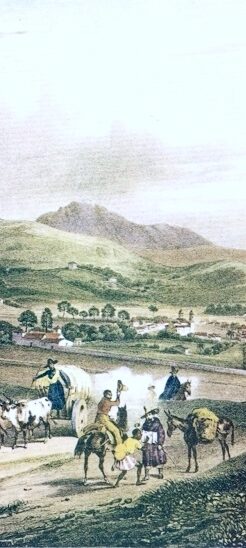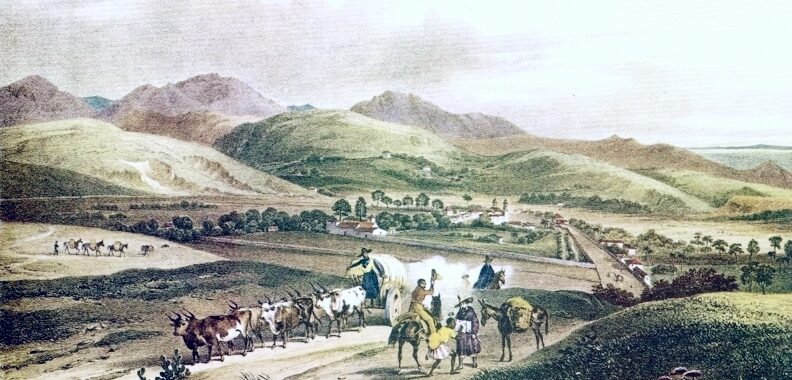



I, Father José Domingos de Carvalho, declare that among the possessions I own, there is a slave named Mariana Creole, daughter of Josefa Mina. I have chosen to grant her freedom as a token of gratitude for her dedicated service and for the affection she has shown me, particularly during my illness. It is also out of reverence for the love of God that I hereby release her from bondage, effective immediately and for all eternity. May she henceforth enjoy the full rights and freedoms afforded to any freeborn individual, without hindrance or constraint, and she will not be required to assist me during my illnesses, [...].
Information found in the Notary Registry Book number 3 (1818 to 1831), 2nd Notary Office, São João del-Rei. Freedom Certificate of Mariana Crioula, issued by Father José Domingos de Carvalho, dated 1823.
"I, Joaquina Angélica da Luz, do hereby declare that, among my other possessions [...], I do emancipate a slave, Antônio of the Cabinda Nation, aged eighty years, granting unto him freedom as if he were born free. This act I do of my own accord, without constraint from any other person, for it is of my own free will. In consideration of his advanced years and infirmities, and in acknowledgment of his many years of faithful service rendered unto me, I do release him from the bonds of servitude. Let it be known to all, particularly to my heirs, that this my disposition is firm and irrevocable [...]."
Information found in the Notary Registry Book number 4 (1821 to 1825), 2nd Notary Office, São João del-Rei. Freedom Certificate of Antônio, of the Cabinda Nation, issued by Joaquina Angélica da Luz, written in 1821
I, Tristão Carlos de Souza, together with my wife, Maria Josefa Duarte, do hereby assert our status as the rightful proprietors of a slave named Francisca, hailing from the Banguela [Benguela] nation. Moved not only by her attainment of maturity but also by the meritorious services she has rendered unto us, we are inclined to extend to her a gracious gesture. Henceforth, she shall find residence in a tranquil setting, released from the shackles of her current bondage. We have thus resolved upon the following: Francisca shall henceforth take up permanent abode within our household, not as a chattel enslaved but as a cherished member of our domestic circle. In exchange for any minor duties she may perform, we pledge to furnish her with support and succor in times of infirmity. She shall enjoy full autonomy in the conduct of her affairs, unfettered by any encumbrance or imposition from our part. In consideration of this arrangement, Francisca has tendered to us the sum of twenty thousand réis, which we have duly accepted in the current currency. Therefore, let it be known to all that henceforth she shall be recognized as a free and emancipated person, absolved from all bonds of servitude, […].
Information found in the Notary Registry Book number 12 (1837 to 1840), 2nd Notary Office, São João del-Rei. Freedom Certificate of Francisca, from the Banguela Nation [Benguela], issued by Tristão Carlos de Souza and his wife Maria Josefa Duarte, written in 1837.
"I, José Marcelino de Barros, the undersigned, declare that among the other assets under my free and general administration, is a black man named Joaquim, from the Congo nation, over sixty years of age. Due to his unwavering fidelity and devoted service to me, rendered willingly and without coercion from any party, I hereby grant him his freedom. Henceforth, he shall enjoy it as if he were born free from his mother's womb. I have not received any payment from him [...]."
Information found in the Notary Registry Book number 9 (1831 to 1833), 2nd Notary Office, São João del-Rei. Freedom Certificate of Joaquim Songo, issued by José Marcelino de Barros, written in 1832
"I, Pedro Teixeira Nogueira, declare that among the assets to be inherited upon the death of my brother, Father João Teixeira Álvares, is a slave named Maria Parda, aged fifty and married to Joaquim Teixeira. Maria, along with other slaves, was unjustly confiscated by the court's treasurer. However, it is my will—and that of all other interested parties who have authorized this—that Maria be liberated. This document serves as a tribute to her. Henceforth, she shall enjoy her freedom as a freedwoman […]."
Information found in the Notary Registry Book number 4 (1821 to 1825), 2nd Notary Office, São João del-Rei. Freedom Certificate of Maria Parda, issued by Pedro Teixeira Nogueira, written in 1821.
"I say to you, Father José Domingos de Carvalho, that among the most important possessions I have is a Creole slave girl named Clara, whom I have set free from today for all time, as if she were born in her mother's womb, and I grant her this benevolence for the love of God, so that she may serve me better for as long as I live, in gratitude for this freedom. I request that His Royal Highness's justice recognize this letter of manumission as fully valid, as it is issued of my own free will. For the validity and transparency of this act, I have signed this freedom certificate."
Information found in the Notary Registry Book number 4 (1821 to 1825), 2nd Notary Office, São João del-Rei. Freedom Certificate of Clara, issued by Father José Domingos de Carvalho, written in 1822.
"I, Ignácio José de Lima, declare that among my possessions, over which I have full and general administration, is a slave named Severina Parda, approximately thirty-two years old. She has three children: Antônio Pardo, Francisco Pardo, and Maria Parda. Entirely of my own free will, and without any coercion, I hereby grant Severina, as well as her three children, their freedom through this Letter of Freedom, as a recognition of her service, granted without any charge."
Information found in the Notary Registry Book number 3 (1818 to 1821), 2nd Notary Office, São João del-Rei. Freedom Certificate of Severina parda and her children: Antônio pardo, Francisco pardo and Maria parda, issued by Ignácio José de Lima, written in 1821.
"I, Manoel Alves de Magalhães, do solemnly avow that amongst the sundry possessions under my sovereign administration, is a man by the name of José, a [?] bequest from my late progenitors. In gratitude for his commendable services rendered unto me, I hereby bestow upon him the boon of liberty, absolving him from all yokes of bondage, [...], this act of emancipation is rendered for the agreed price and sum of thirty-eight thousand four hundred reis [...]."
Information found in the Notary Registry Book number 3 (1818 to 1821), 2nd Notary Office, São João del-Rei. Freedom Certificate of José Cabra, issued by Manoel Alvares de Guimarães, written in 1820.
“Digo eu, abaixo assinado, Félix Gomes da Silva, que foi tutor, possuidor, com livre e geral administração, de uma escrava por nome de Benedita crioula, filha de João e Thereza, a qual continuará a servir-me na mesma qualidade de cativa durante o tempo da minha existência, por minha morte a hei por forra, e liberta, como assim nascesse da sua mãe, mas só por gratidão aos bons serviços que me tem feito, como por caridade que lhe devo prestar, porque seja isto muito de minha vontade, meus herdeiros e testamenteiros cumprirão, imploro de justiças de sua majestade dêem a este papel todo o vigor, para que conste vai por mim firmado, perante as testemunhas e geralmente assinadas.”
Information found in the Notary Registry Book number 3 (1818 to 1821), 2nd Notary Office, São João del-Rei. Freedom Certificate of José Cabra, issued by Manoel Alvares de Guimarães, written in 1820.
I, Elena Pereira do Espírito Santo, widow of Francisco Machado de Tolledo, hereby declare that among the assets inherited from my late husband, free and clear, is a Creole named Bento, son of my Creole slave Luíza. I raised Bento myself and it is my free and uncoerced will that he be freed. He shall earn his freedom by compensating me with one pound of gold, equivalent to one hundred twenty-eight "oitavas", payable over six or seven years. However, he must never leave my company, serving me daily for two vinténs per day. If he works outside my direct service, it must be with my consent and he must share his earnings with me, which will be credited against his manumission fee. Should I die before the seven years are up and Bento still owes part of his manumission, he must first arrange for ten masses for the soul of my deceased husband as specified in his lifetime. If Bento can prove the masses were said before my death, I will grant him a manumission letter. Furthermore, Bento is to donate four ounces to the Treasurer or Proxy of Our Lady of Conceição da Ibitipoca, obtaining a receipt for this donation, as directed in my husband's will. The remainder, after these deductions, will go to my granddaughters Lourença Anna and Maria, daughters of my deceased son Manoel Francisco Machado, to be equally divided. If, after seven years, Bento has not fully paid the manumission fee, my granddaughters, whom I advise with prudent judgment, shall grant him enough time to complete the payment without reverting him to captivity. Thus, under these terms [?], I have manumitted Bento, who may use this letter, either in my lifetime or posthumously, to confirm his freedom in court, provided he has fulfilled all these stipulated conditions. I implore the justices of His Royal Highness to recognize this document as valid as a formal manumission, thereby granting him freedom as if born free from his mother's womb. as if it were a freedom certificate, and he will remain free as if he had been born from his mother's womb.
Information found in the Notary Registry Book number 3 (1818 to 1821), 2nd Notary Office, São João del-Rei. Freedom Certificate of Bento Crioulo, issued by Elena Pereira do Espírito Santo, 1821.
"Behold! Alluvial Gold Abounds!"
"Rio das Mortes, situated westward from Vila Rica on the road to São Paulo, was discovered by Tomé Portes del-Rei, a native of Taubaté, long after earlier discoveries had been made. This river, which lies a five-day journey from São Paulo before one reaches Vila Rica, was often traversed by explorers who had yet to tap into its potential. The delayed discovery of the river appears to have been an act of divine providence intended to extend accumulation of wealth by Tomé Portes del-Rei. [...] Tomé Portes, who dwelt along its banks, spent years attending to the needs of miners journeying to and from the mines, accumulating considerable wealth. It was only later that he unearthed gold in the river's gravels, by performing his own experiments on it."
Afonso de Taunay (1876-1958) – Brazilian writer, historian, and politician, renowned for his historical novels, academic contributions, and political endeavors.
"Judicial District of Rio das Mortes"
I hereby inform all the faithful and generous American subjects of this District that I have just received the most joyful news that can be conveyed to these same subjects from His Royal Highness, Our August and Most Loving Prince, that His Royal Highness, along with his entire August family, is soon to arrive in the city of Rio de Janeiro. Given this unforeseen event, these esteemed subjects should eagerly anticipate from His Highness the utmost advantages and happiness that can be desired for such an Honorable, Magnificent, and Paternal Prince. We admire in His Highness all the brilliant qualities that distinguish true Heroes, as well as those that will distinguish him among the most illustrious Portuguese Monarchs, such as Kings Dom João Segundo and Dom José Primeiro. Now that we are about to have such a great, distinct and unexpected happiness, we must all be fully prepared to demonstrate our profound appreciation for it in every conceivable manner, by organizing everything within our capabilities to accommodate his needs. Let us ensure that everything available in this region is prepared for his arrival in the city where He is expected to disembark, and, above all, the foodstuffs and provisions listed in a document I received today from the Most Excellent General of this prosperous Captaincy: Bacon - Pork - Rice - Cheese - Faritear (sic) - Manioc flour - Beans and everything else that [illegible]. All mule beasts deemed capable of rendering proper service, as recognized by all the Tropeiros (drovers) of this District and beyond, are hereby prohibited from embarking on any journey without my authorization, unless it is to transport from Rio de Janeiro all the goods owed to His Majesty. These goods must be fully supplied with everything, in accordance with the directives of our esteemed and respectful Prince, the Lusitanian Monarch, who seeks to bring happiness to our blessed land [...].
This excerpt was taken from Revista do Arquivo Público Mineiro (Minas Gerais Public Archive Magazine). (Arrival of King João VI), from the Official Press of Minas Gerais, from July to December 1805.
Travelers' accounts
"This town serves as the administrative center of the whole judicial district; it is nestled in a flat valley at twenty-one degrees and twenty minutes south latitude [...]. It is crossed in the middle by a stream, which has two bridges. The streets are grandiose, and the temples and other buildings exude a certain nobility."
Account by José João Teixeira Coelho, Gold Intendant of the Captaincy of Minas Gerais between 1768 and 1779. This excerpt was taken from the book Instrução para o Governo da Capitania de Minas Gerais. (Instructions for the Government of the Captaincy of Minas Gerais.)
Mining
"In the past, gold mining was the primary occupation, with even rocks being excavated fruitlessly. Evidence of this can still be seen in the form of large pits, more than 25 meters deep, carved into the talc schist outside of town, now filled with water. Mining was so abundant; gold was found everywhere. Today, the town's inhabitants primarily sustain themselves through commerce, as evidenced by the presence of stores or shops in nearly every household. Agriculture also plays a significant role, with crops including sugar, coffee, cotton, corn, manioc, and some wheat. Additionally, pig farming is a particularly important source of income for the community. Industry is not relevant. There are few craftsmen. The most important products manufactured are rustic wool hats and coarse cotton fabrics, which serve as substitutes for linen in this area."
An account by Johann Emanuel Pohl, an Austrian botanist renowned for his contributions to Brazilian flora. This excerpt was taken from his book Viagem ao interior do Brasil (1817-1821) (Journey to the Interior of Brazil (1817-1821)